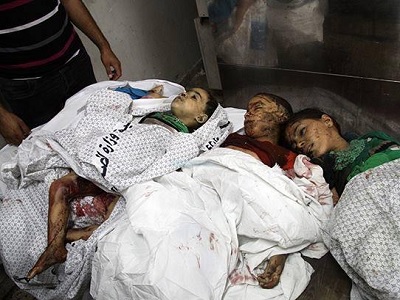
The story begins in the middle of one of the deadliest battles of last summer’s Gaza war, in the Shujaiyeh neighborhood, where some 100 Palestinians and over a dozen Israeli soldiers were killed. On July 22, IDF Cpt. Dima Levitas was killed by Palestinian fire. Levitas was laid to rest the next day in Jerusalem’s Mount Herzl military cemetery.
Because the fighting was still ongoing, his fellow soldiers were still positioned in the same area where Levitas was killed and were unable to attend his funeral. So they decided to participate remotely, and to give him 120-mm tank shell version of a 21-gun salute.
One day later, on the NRG news site, formerly the website of Ma’ariv and now owned by Israel Hayom, an audio clip was published. According to the NRG report, the clip is a recording — over the army two-way radio — of Lt.-Col. Neriya Yeshurun eulogizing Levitas, and ultimately ordering a barrage of tank fire, “in his honor,” directed at a medical clinic.
The following is (my) translation of the recording, allegedly of Yeshurun, as rebroadcast by Israel’s Channel 10 this week:
At this very moment, as Dima is being buried at the cemetery in Mount Herzl in Jerusalem, the heart wants very much to be in Jerusalem but the mind says that [we] need to be here, that we need to continue.
We didn’t come here for fun and we have an important mission that I’m very proud to see you all taking part in. I trust that you will all march on despite the pain and despite the hardships that accompany every soldier — to continue [carrying out your mission] as best you can.
Here, in the middle of Shujaiyeh, in Gaza, I want us to join all of those people who are accompanying Dima on his final journey. We will fire a barrage in his honor, for this officer, toward the clinic from which the scoundrels fired on his tank and took his life.
I trust you all and I’m proud of you — prepare for a barrage in memory of Dima, may his soul be bound up in the bond of life, amen.
The lieutenant-colonel seems to order tank shells be shot at a medical clinic when there is no apparent military need, and no immediate threat emanating from the building. If that is the case, it could be a war crime.
– Read more: How an Alleged War Crime Goes Away — and Resurfaces a Year Later – Michael Schaeffer Omer-Man, 972Mag





